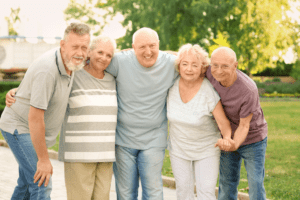With over 36 million Americans older than 65, a surge of healthcare problems may soon face older adults.

According to the American Psychological Association’s Resolution, about 25 percent of older adults suffer from some form of mental disorder, which can impede physical health and independence. Fortunately, a variety of treatments are effective in improving mental and behavioral health problems in later life.
Along with mental health, a host of issues related to our aging population must be addressed. From healthcare and insurance changes to family and community support, the elderly and those who care for them face a number of challenges.
Here are six common concerns facing this population and a few tips on how to address them:
Isolation — This could be from peers, family and/or community. Feelings of worthlessness plague the elderly when they are not able to participate in everyday activities or when they are deliberately excluded. Loss of motivation and purpose increases this feeling of isolation.
Helpful Tip: Include the elderly in as many family activities as you are able to decrease the isolation. Tap into your community resources for support and activity ideas, such as day centers or church facilities.
Loss of Independence — Having to wait for someone else to do something for them further increases feelings of helplessness, isolation and depression. Not being able to do daily activities is something we often take for granted.
Helpful Tip: Even when a person moves slowly or is unable to do something for himself or herself, they should still be asked to do some small part of the chore or task if they are able. Acknowledge their contribution and let them know it is valued.
Physical Limitations — Many people face a progressive deterioration of their health. Feelings of worthlessness, helplessness, and being overwhelmed can prevail. Not being able to handle a situation or circumstance of life increases frustration and often causes depression. Ongoing pain, fears of falling, and other safety concerns are paramount with the elderly. Unreported health concerns go unreported more with this population than any other.
Helpful Tip: Encourage them to ask questions and share any concerns about their health, medications and any physical limitations. Be sure to check with their insurance plan to access valuable physical therapy benefits. Continue to include them in as much activity as possible with others. Let them handle as much as is feasible and appropriate, even if they can’t do it fully.
Loss of Spouse and Friends — Loss of a spouse or significant other is often unmanageable for the elderly. Allow them time to grieve, mourn and vent their feelings. This requires patience and acceptance. Similarly, loss of same-age friends is difficult at any age. With the elderly, these events are magnified because it brings them face-to-face with their own pending mortality.
Helpful Tip: Go through old pictures of better times with them, allow them some time to reminisce, acknowledge their pain and let them know it’s okay to feel as they do. Allow them to grieve. Be patient.
Loss of Appreciation and Consideration by Others — This can manifest itself when someone makes decisions for an older person without getting their input or consent. It is presumptuous and imposing, no matter how well-meant.
Helpful Tip: If they are able to participate in the decision-making process, let them do so. Don’t assume you know what it is they want or what’s best for them.
Condescending Attitudes of Others — Assuming that the person is not intelligent or capable just because they’re elderly is disrespectful and rude. Ignoring the value of their wisdom and experience is a mistake.
Helpful Tip: Remind yourself that this elderly man or woman once had an active, meaningful life too. The wisdom of their experience is always valuable to our society, even if “things have changed.” As much as society has seen myriad changes and new technology, people are still basically the same. Give them the courtesy that you would extend to any other person.





















